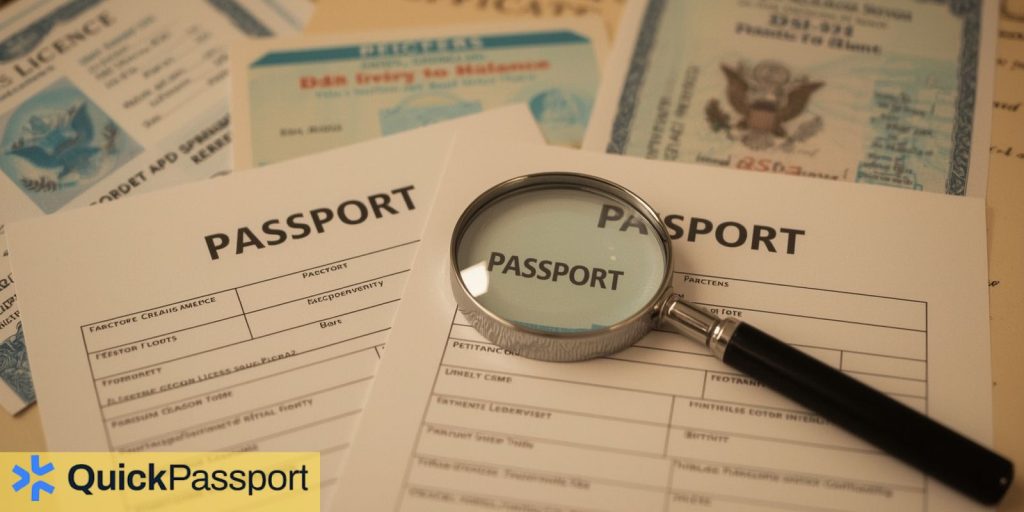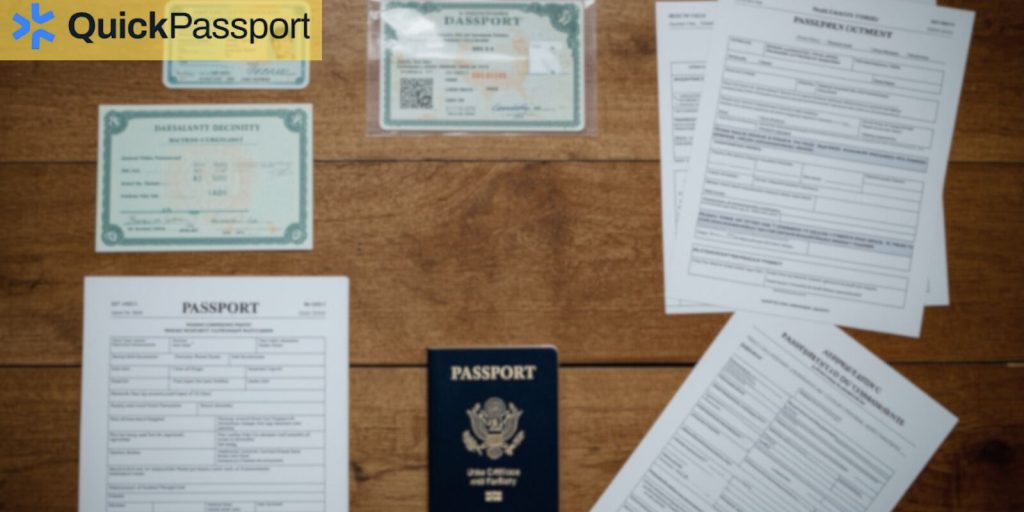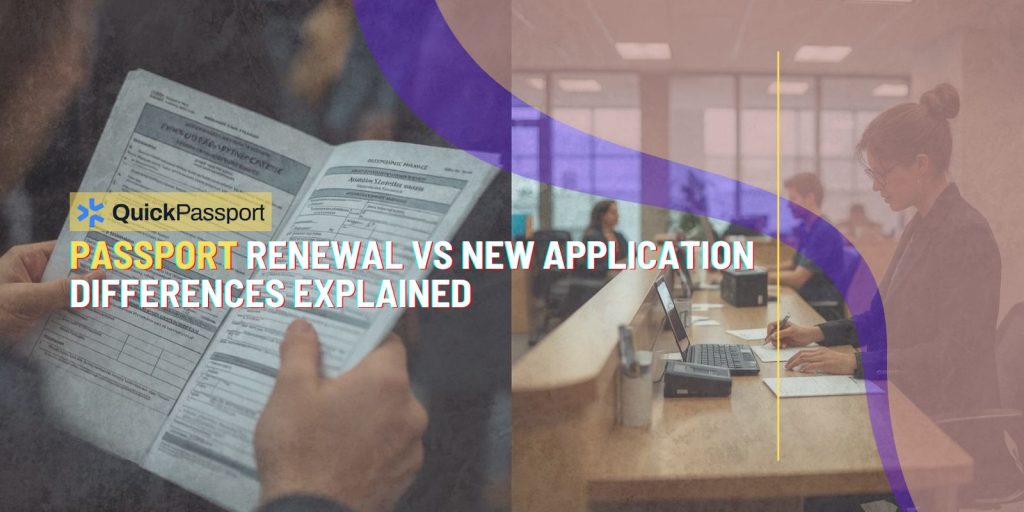Navigating the world of passport applications can be confusing, especially when you’re trying to determine whether you need to renew an existing passport or apply for a completely new one. The distinction between passport renewal and new application processes is crucial because it affects everything from the required documentation and fees to processing times and where you can submit your application.
Understanding these differences can save you significant time, money, and frustration. Many people assume they can simply renew their passport regardless of their circumstances, only to discover at the last minute that they actually need to go through the more complex new application process. This misconception can derail travel plans and create unnecessary stress, particularly when dealing with tight deadlines.
The passport renewal process is generally more straightforward and convenient, allowing eligible applicants to submit their applications by mail without visiting a passport acceptance facility. However, specific eligibility criteria must be met to qualify for renewal. If you don’t meet these requirements, you’ll need to apply for a new passport, which involves additional steps, different documentation, and in-person submission at an authorized location.
These processes also differ significantly in terms of cost, with new applications typically requiring higher fees due to additional processing requirements. Processing times can vary between the two options, and understanding these differences is essential for proper planning, especially if you have upcoming travel dates. Whether you’re a first-time passport applicant, someone whose passport has been lost or stolen, or simply looking to update an expired document, knowing which path to take will ensure a smoother experience and help you obtain your travel document efficiently.
Key Takeaways
For additional context, see this comprehensive guide.
- Eligibility Requirements: Passport renewal is only available if your most recent passport was issued when you were 16 or older, was issued within the last 15 years, is undamaged, and you can submit it with your application. If any of these conditions aren’t met, you must apply for a new passport.
- Application Method: Eligible renewals can be submitted by mail using Form DS-82, making the process more convenient and eliminating the need for in-person visits. New applications require Form DS-11 and must be submitted in person at an authorized passport acceptance facility.
- Documentation Differences: Renewal applications require your most recent passport, a new photo, and the completed form. New applications need proof of citizenship, government-issued photo ID, a passport photo, and the application form, with additional requirements for minors.
- Cost Variations: Passport renewals typically cost less than new applications because they don’t require the execution fee that’s charged for new passports. The total cost difference can be significant, especially when factoring in expedited processing options.
- Processing Times: Both processes have similar standard processing times, but renewal applications submitted by mail may have slight variations compared to new applications processed at acceptance facilities. Expedited options are available for both types of applications when faster processing is needed.
- Name Changes: If your name has changed since your last passport was issued, you cannot use the renewal process unless you can document the name change with specific acceptable documents. Otherwise, you’ll need to apply for a new passport.
Understanding Passport Renewal vs New Application: An Overview
The fundamental difference between passport renewal and new passport applications lies in your eligibility and the complexity of the process. Passport renewal is designed as a streamlined option for individuals who already possess a valid or recently expired U.S. passport and meet specific criteria. This process recognizes that these applicants have already been through the initial vetting process and simply need to update their travel document.

New passport applications, on the other hand, are required for first-time applicants, those whose passports don’t meet renewal criteria, or individuals who need to replace lost, stolen, or significantly damaged passports. This process involves more thorough documentation and verification procedures because the applicant’s identity and citizenship must be established from scratch or re-established due to changed circumstances.
The renewal process assumes continuity from your previous passport, which is why you must submit your most recent passport as part of the application. This document serves as proof of your previous citizenship verification and helps streamline the process. New applications require primary documentation of citizenship and identity, making them more comprehensive but also more time-consuming.
Understanding which category you fall into is essential before beginning your application. Many applicants waste time and effort by starting with the wrong process, leading to delays and additional complications. The eligibility requirements for renewal are strict and non-negotiable, so it’s crucial to honestly assess your situation before proceeding. If you have any doubts about your eligibility for renewal, it’s better to err on the side of caution and apply for a new passport to avoid potential rejections or delays.
Eligibility Requirements: When to Renew vs Apply New
Determining your eligibility for passport renewal involves meeting four specific criteria, all of which must be satisfied to use the renewal process. First, your most recent U.S. passport must have been issued when you were 16 years of age or older. This requirement exists because passports issued to minors under 16 have different validity periods and security considerations, necessitating the more thorough new application process when they reach adulthood.
Second, your most recent passport must have been issued within the last 15 years. This timeframe ensures that the security features and biometric data from your previous passport are still current and reliable. Passports older than 15 years were issued under different security standards, and the government requires updated verification procedures for these older documents.
Third, your current passport must be undamaged and in your possession to submit with your renewal application. Significant damage includes water damage, torn or missing pages, unauthorized markings, or any alteration that affects the passport’s integrity. Even minor damage that affects the passport’s readability or security features can disqualify you from renewal eligibility.
Fourth, you must be applying for a renewal in the same name as your most recent passport, or you must be able to document your name change with acceptable legal documents. Acceptable documentation for name changes includes certified marriage certificates, divorce decrees, or court orders. If you cannot provide proper documentation for a name change, you’ll need to apply for a new passport.
If you don’t meet any of these criteria, you must apply for a new passport using Form DS-11. This includes first-time applicants, those with lost or stolen passports, applicants whose passports were issued when they were under 16, those with passports older than 15 years, or anyone with damaged passports. Additionally, if you’re switching between passport books and passport cards or need to add pages (though additional pages are no longer available), you’ll need to apply for a new passport. For comprehensive information about the renewal process, you can explore our detailed guide that covers all aspects of updating your travel documents.
Required Documentation and Forms
The documentation requirements for passport renewal and new applications differ significantly, reflecting the different levels of verification needed for each process. For passport renewals, the documentation is relatively straightforward since you’re building upon previously verified information. You’ll need to complete Form DS-82, which is specifically designed for renewal applications and can be filled out online or downloaded and completed by hand.

Along with Form DS-82, renewal applicants must submit their most recent U.S. passport, which serves as proof of citizenship and previous verification. This passport will be cancelled and returned to you with your new passport. You’ll also need one recent passport photo that meets current State Department specifications, including size, background color, and quality requirements. If your name has changed since your last passport, you must include certified documentation of the name change, such as a marriage certificate or court order.
New passport applications require Form DS-11, which must be completed but not signed until you appear in person at a passport acceptance facility. This form requires more detailed information and must be witnessed during the application process. The documentation requirements for new applications are more extensive because your citizenship and identity must be established independently.
For proof of U.S. citizenship, new applicants can submit a certified birth certificate issued by the city, county, or state, a previous U.S. passport, a naturalization certificate, or a certificate of citizenship. The birth certificate must be an official copy with a registrar’s raised, embossed, impressed, or multicolored seal. Photocopies, hospital certificates, and delayed birth certificates require additional documentation.
New applicants must also provide proof of identity with a valid driver’s license, government employee ID, current military ID, or naturalization certificate. The ID must be current, undamaged, and include your photo and signature. If you cannot provide acceptable primary identification, you may submit two forms of secondary identification, such as social security cards, credit cards, or employee IDs, along with an identifying witness who has known you for at least two years.
One recent passport photo is required for new applications, meeting the same specifications as renewal photos. Minors under 16 have additional requirements, including evidence of the relationship to parents or guardians and consent from both parents unless specific exceptions apply. Understanding these documentation differences is crucial for ensuring your application is complete and avoiding delays in processing.
Application Submission Process
The submission process represents one of the most significant differences between passport renewal and new applications, with renewal offering much greater convenience and flexibility. Eligible renewal applicants can submit their applications entirely by mail, eliminating the need to visit a passport acceptance facility or take time off work for an in-person appointment. This mail-in option makes renewal particularly attractive for busy professionals and those who live far from acceptance facilities.
To submit a renewal by mail, you’ll send your completed Form DS-82, most recent passport, new passport photo, appropriate fees, and any name change documentation to the address specified in the renewal instructions. The National Passport Processing Center handles all mail-in renewals, and you can track your application status online once it’s received and entered into the system. It’s recommended to use a trackable mailing method to ensure your documents reach their destination safely.
New passport applications require in-person submission at an authorized passport acceptance facility, which includes many post offices, libraries, clerks of court, and other government offices. During your visit, a trained acceptance agent will review your documentation, witness your signature on Form DS-11, and administer an oath. This in-person requirement exists because new applications require identity verification and the collection of biometric data.
Before visiting an acceptance facility for a new application, it’s wise to call ahead and confirm their hours, whether appointments are necessary, and what payment methods they accept. Some facilities operate on a walk-in basis, while others require appointments, especially during busy travel seasons. Bringing exact change or a check can speed up the process, as not all facilities accept credit cards for government fees.
Both types of applications can be expedited for faster processing, but the submission methods differ. Expedited renewals are still submitted by mail but to a different address with additional fees. Expedited new applications can be submitted at acceptance facilities with expedited service requests, or for the fastest processing, directly at regional passport agencies for urgent travel needs. Regional agencies require appointments and proof of imminent travel, typically within two weeks for international travel or four weeks if a visa is required.
The convenience factor of mail-in renewal cannot be overstated, especially for frequent travelers who need to renew their passports regularly. However, this convenience comes with the responsibility of ensuring all documentation is correct and complete before mailing, as any errors will result in delays and potentially having to restart the process. If you’re interested in learning more about this process, our comprehensive guide provides detailed information about efficient passport services in the Denver area.
Processing Times and Fees
Understanding the cost structure and processing times for passport renewal versus new applications helps you plan appropriately and budget for your travel document needs. While both processes have similar standard processing times, the fees differ due to the additional services required for new applications. Currently, standard processing takes approximately 6-8 weeks for both renewals and new applications, though these times can fluctuate based on seasonal demand and operational factors.

Passport renewal fees are generally lower because they don’t include the execution fee required for new applications. The renewal fee covers the cost of processing your application and issuing a new passport book. If you’re renewing a passport card or want both a book and card, additional fees apply. The cost structure is straightforward for renewals, with clear pricing for standard and expedited processing options.
New passport applications include both an application fee and an execution fee. The application fee covers the cost of processing and issuing the passport, while the execution fee pays for the in-person services provided by the acceptance facility, including document review, identity verification, and oath administration. This execution fee is paid directly to the acceptance facility and is separate from the application fee paid to the State Department.
Expedited processing is available for both types of applications at an additional cost, reducing processing time to approximately 2-3 weeks. This expedited service is particularly valuable during peak travel seasons or when you have upcoming travel plans. The expedited fee is the same for both renewals and new applications, but when combined with the base fees, new applications still cost more overall.
For urgent travel needs, expedited service at regional passport agencies can process applications in 1-2 business days, but this requires appointments and proof of imminent international travel. This emergency service is available for both renewals and new applications, though the appointment availability and requirements are the same regardless of application type.
Additional services like overnight delivery of your completed passport add to the total cost but can be valuable when timing is critical. Both renewal and new application processes offer these delivery options, and the fees are identical. When budgeting for your passport, consider not only the base fees but also any expedited processing or special delivery services you might need based on your travel timeline and circumstances.
QuickPassport – Denver: Your Local Passport Solution
When navigating the complexities of passport renewal versus new applications in the Denver area, QuickPassport – Denver provides expert guidance and efficient processing services to ensure you choose the right path for your specific situation. Our experienced team understands the nuances of both processes and can quickly assess your eligibility for renewal or guide you through the new application requirements.
Located conveniently in Denver, QuickPassport specializes in helping Colorado residents and visitors obtain their travel documents efficiently and correctly the first time. Whether you’re eligible for the streamlined renewal process or need to submit a new application, our knowledgeable staff can review your documentation, ensure compliance with current requirements, and help expedite your application when necessary.
Our services are particularly valuable for those facing time constraints or complex situations, such as name changes, damaged passports, or urgent travel needs. We stay current with all State Department requirements and procedural changes, ensuring that your application meets the latest standards and avoiding common mistakes that can lead to delays or rejections.
QuickPassport – Denver also provides comprehensive support for expedited processing, helping you navigate the various options available based on your travel timeline. From standard expedited service to emergency processing for urgent travel, we can guide you through the requirements and help secure the fastest possible processing for your situation. Our local expertise combined with efficient processing makes us the ideal choice for Denver-area residents who need reliable passport services.
Frequently Asked Questions
Can I renew my passport if it expired more than 15 years ago?
No, if your passport expired more than 15 years ago, you cannot use the renewal process and must apply for a new passport using Form DS-11. This requirement exists because passports older than 15 years were issued under different security standards and require updated verification procedures.
What happens if I submit a renewal application but I’m not eligible?
If you submit a renewal application when you’re not eligible, your application will be rejected, and your documents will be returned to you. You’ll then need to apply for a new passport using the correct process, which will delay your application significantly.
Can I renew my passport if my name has changed?
You can renew your passport with a name change only if you can provide acceptable documentation of the name change, such as a certified marriage certificate, divorce decree, or court order. If you cannot provide proper documentation, you must apply for a new passport.
Is the processing time different for renewals versus new applications?
Standard processing times are similar for both renewals and new applications, typically 6-8 weeks. However, renewals submitted by mail may have slight variations compared to new applications processed at acceptance facilities, depending on current workloads.
Can I upgrade from a passport card to a passport book through renewal?
No, you cannot upgrade from a passport card to a passport book through the renewal process. You must apply for a new passport book using Form DS-11, even if your passport card is eligible for renewal.
What if my passport is damaged but still readable?
Even minor damage that affects readability or security features can disqualify you from renewal eligibility. If you’re unsure whether your passport damage disqualifies you from renewal, it’s safer to apply for a new passport to avoid rejection.
Can I renew my child’s passport when they turn 16?
No, passports issued to children under 16 cannot be renewed regardless of the child’s current age. When a child with a minor passport needs a new passport, they must apply for a new adult passport using Form DS-11.
Do I need to provide the same documents for expedited processing?
Yes, expedited processing requires the same documentation as standard processing. The only difference is the additional expedited fee and faster processing time. All eligibility requirements and documentation standards remain the same.
Conclusion
Understanding the differences between passport renewal and new applications is essential for ensuring a smooth and efficient process when obtaining your travel document. The key factors that determine which process you’ll use—your passport’s age, condition, and your personal circumstances—directly impact everything from required documentation and fees to submission methods and processing times.
Passport renewal offers significant advantages in terms of convenience and cost for eligible applicants, allowing mail-in submission and lower fees. However, the strict eligibility requirements mean that many applicants must use the new application process, which involves more documentation, in-person submission, and higher costs but provides the same reliable result.
Taking the time to properly assess your eligibility before beginning your application can save you considerable time, money, and frustration. If you have any doubts about which process applies to your situation, consulting with passport professionals or carefully reviewing the official requirements can prevent costly mistakes and delays. Whether you’re planning a last-minute business trip or preparing for a future vacation, understanding these differences ensures you’ll obtain your passport efficiently and be ready for your international travels.






